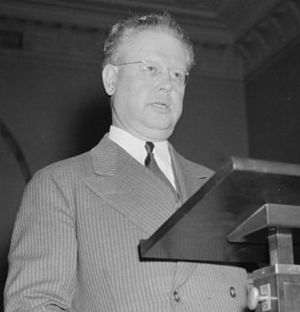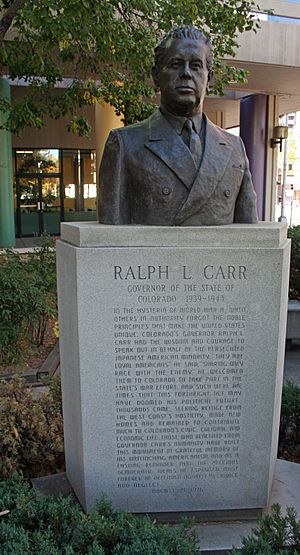Ralph Lawrence Carr facts for kids
Quick facts for kids
Ralph Lawrence Carr
|
|
|---|---|
 |
|
| 29th Governor of Colorado | |
| In office January 10, 1939 – January 12, 1943 |
|
| Lieutenant | John Charles Vivian |
| Preceded by | Teller Ammons |
| Succeeded by | John Charles Vivian |
| Personal details | |
| Born | December 11, 1887 Rosita, Colorado, U.S. |
| Died | September 22, 1950 (aged 62) Denver, Colorado, U.S. |
| Nationality | American |
| Political party | Republican |
| Spouses | (1) Gretchen Fowler (2) Eleanor Fairall Howe |
| Profession | lawyer, newspaper editor |
Ralph Lawrence Carr (born December 11, 1887 – died September 22, 1950) was an American lawyer and politician. He served as the 29th Governor of Colorado from 1939 to 1943. He is especially remembered for standing up for the rights of Japanese Americans during World War II.
Contents
Early Life and Career
Ralph Carr was born in Rosita, Colorado in 1887. He grew up in Cripple Creek, Colorado. After finishing Cripple Creek-Victor High School in 1905, he went on to study law. He earned his law degree from the University of Colorado in 1912.
Carr worked as a private lawyer for over ten years. Later, he moved to Denver. In 1929, President Herbert Hoover chose him to be the U.S. Attorney for Colorado. This meant he was the chief lawyer for the federal government in the state.
Serving as Governor of Colorado
In 1938, Ralph Carr ran for governor of Colorado. He was elected for a two-year term, beating the current governor, Teller Ammons. He was a Republican who believed in careful spending by the state government. He also disagreed with President Franklin D. Roosevelt's "New Deal" programs, which aimed to help the country recover from the Great Depression.
Key Decisions and Re-election
In July 1939, Governor Carr joined 33 other governors. They called for "moral rearmament" to help solve the economic problems of the time. In August, he sent the Colorado National Guard to stop fighting. This fighting was between striking workers and non-strikers at the Green Mountain Reservoir construction site.
In late 1939, some people thought Carr might run for Vice-President in 1940. However, he said he preferred to stay in Colorado and seek re-election as governor. He was re-elected in 1940 for another term.
In January 1941, Governor Carr showed his belief in fairness. He pardoned a man named Michael Fillipo. This man had escaped from prison in 1915. He later served in the U.S. Army during World War I and lived a good life with his family. He voluntarily revealed his past when registering as a non-citizen.
Running for the U.S. Senate
In July 1942, the Republican Party in Colorado chose Carr to run for the U.S. Senate. He ran against the Democratic Senator Edwin C. Johnson. Carr talked about returning to a two-party system and protecting constitutional rights. He lost the election by a small number of votes in November.
In September 1950, Carr tried to become governor again. He won the Republican nomination shortly before he passed away.
Standing Up for Japanese Americans
One of Governor Carr's most important actions was his support for Japanese Americans during World War II. After the attack on Pearl Harbor, many people in the U.S. felt angry and fearful. President Roosevelt issued Executive Order 9066 in February 1942. This order led to the forced removal and imprisonment of Japanese Americans from the West Coast. They were sent to special camps called internment camps. One of these camps, called Amache, was built in Colorado.
A Unique Stance Among Governors
Most governors in Western states supported these internment camps. They also did not want the camps in their states. But Governor Carr took a different path. He believed it was wrong to imprison American citizens just because of their race or family background. He said that these citizens had the same rights as anyone else under the Constitution.
Carr agreed that Colorado should accept its share of people moved from the West Coast. He insisted they be treated with respect. He also reminded people that the war was against several countries, not just Japan. This helped to show that the conflict was not about race.
Speaking Out for Rights
Governor Carr famously said:
They are as loyal to American institutions as you and I. Many of them have been born here–are American citizens, with no connection or feeling of loyalty toward the customs and philosophies of Italy, Germany and Japan. ... I am not talking on behalf of Japanese, of Italians, or of Germans as such when I say this. I am talking to ... all American people whether their status be white, brown or black and regardless of the birthplaces of their grandfathers when I say that if a majority may deprive a minority of its freedom, contrary to the terms of the Constitution today, then you as a minority may be subjected to the same ill-will of the majority tomorrow.
In another speech, he spoke to a large, upset crowd of Colorado farmers. He told them:
They are not going to take over the vegetable business of this state, and they are not going to take over the Arkansas Valley. But the Japanese are protected by the same Constitution that protects us. An American citizen of Japanese descent has the same rights as any other citizen. ... If you harm them, you must first harm me. I was brought up in small towns where I knew the shame and dishonor of race hatred. I grew to despise it because it threatened [pointing to various audience members] the happiness of you and you and you.
Many people believe that Carr's strong support for Japanese Americans cost him his political career. He lost the 1942 Senate election to Edwin C. Johnson. Johnson had argued against Japanese Americans entering Colorado.
Personal Life
Ralph Carr married Gretchen Fowler. They adopted two children, a boy and a girl.
Carr passed away in a Denver hospital on September 22, 1950. He had been ill for a long time due to diabetes. He was buried in Fairmount Cemetery in Denver.
Legacy and Recognition

Ralph Carr's actions left a lasting impact. In 1976, a statue of him was placed in Denver's Sakura Square. This was to honor his efforts for Japanese Americans. The inscription on the statue thanks him for his "unflinching Americanism."
A street running through several western suburbs of Denver is named after him. These suburbs include Westminster, Arvada, Wheat Ridge, and Lakewood.
In 1994, Emperor Akihito and Empress Michiko of Japan visited Denver. They did this to honor Carr and Colorado's role during the Japanese internment.
In 1999, the Denver Post newspaper named Ralph Carr its "Person of the Century."
On March 14, 2008, both parts of the Colorado legislature voted to name a section of U.S. Route 285 the "Ralph Carr Memorial Highway." A monument to him was dedicated there in 2010. It includes a quote from Carr about protecting constitutional rights.
In June 2008, Colorado Governor Bill Ritter signed a law. This law allowed for a new state judicial building in Denver to be named the Ralph L. Carr Colorado Judicial Center. This center is home to the Colorado State Supreme Court and other important legal offices.
In July 2012, the Japanese American Citizens League created a special award in his honor.

